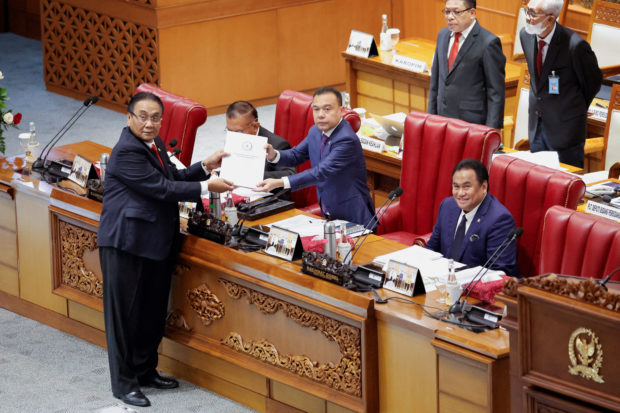EXPLAINER: Why is Indonesia’s new criminal code so controversial?

Bambang Wuryanto, head of the parliamentary commission overseeing the revision, passes the report of the new criminal code to Sufmi Dasco Ahmad, Deputy speaker of the House of Representatives, during a parliamentary plenary meeting in Jakarta, Indonesia, December 6, 2022. REUTERS
JAKARTA — Indonesia’s new criminal code ushers in a raft of new laws, including banning sex outside of marriage, insulting the president, and expressing any view that runs counter to state ideology.
What is controversial?
Among the most contentious articles are those that criminalize sex outside marriage with a punishment of up to one year in jail. Cohabitation between unmarried couples is also banned.
The laws have been partially watered down from an earlier version of the bill so that they can only reported by some people, such as a spouse, parent or child of the offenders.
Still, critics are concerned the laws can be used to police morality in the world’s largest Muslim-majority nation, which has seen a rise in religious conservatism in recent years.
And since they also apply to foreigners, the laws can scare away visitors, including those coming to the prime tourism destination of Bali.
Article continues after this advertisementCurrently Indonesia bans adultery but not premarital sex.
Article continues after this advertisementIn addition, the articles that ban insulting the president or state institutions, blasphemy, protesting without notification and spreading views deemed to run counter to Indonesia’s secular state ideology have also raised fears about threats to freedom of expression and association.
An article on customary law has triggered concern that some sharia-inspired local bylaws could be replicated in other areas, reinforcing discrimination against women or LGBT groups.
Who will be affected?
The new laws will apply to Indonesian citizens and foreigners alike, but will not come into effect for another three years as implementing guidelines are drafted.
Weeks after hosting a successful Group of Twenty (G20) summit that reinforced Indonesia’s position on the global stage, business groups say the new code threatens to damage the country’s image as a tourist and investment destination.
Shinta Widjaja Kamdani, deputy chairperson of the Indonesian Employers’ Association (APINDO), said the rules would do “more harm than good” and act a deterrent to investment.
Indonesia is also trying to entice foreign visitors back after the pandemic and the national tourism board described the new code as “totally counter-productive”.
“We deeply regret that government have closed their eyes. We have already expressed our concern to the ministry of tourism about how harmful this law is,” said Maulana Yusran, deputy chief of Indonesia’s tourism industry board.
What has been the response so far?
The passage of the bill comes after earlier plans to pass a revised code were shelved in 2019 amid mass street protests across the archipelago over the threat to civil liberties. President Joko Widodo stepped in and put the process on hold.
But recent public opposition has been muted in comparison and parliament has revised some of the articles even though critics say the changes do not go far enough and describe the bill’s passage as a “huge setback” for Indonesia’s young democracy.
Why has the new code been introduced?
Indonesia has been discussing revising its criminal code since declaring independence from the Dutch in 1945.
Deputy justice minister, Edward Omar Sharif Hiariej, told Reuters ahead of the bill’s passage he was proud his country would have a criminal code “in line with Indonesian values” and it was time to move beyond its colonial-era laws.
Indonesia’s population is predominantly Muslim but has sizeable groups of Hindus, Christians and people of other faiths. Most Indonesian Muslims practice a moderate version of Islam, but in recent years religious conservatism has crept into politics.
The new code was passed with the support of all parties in the parliament, which is dominated by a large government coalition, and also Islamic parties and groups.
Defending the passage of the bill against criticism, Indonesia’s Law and Human Rights Minister Yasonna Laoly told parliament on Tuesday: “It’s not easy for a multicultural and multi-ethnic country to make a criminal code that can accommodate all interests.”
RELATED STORIES
Indonesian city carries out condom raids to prevent ‘free sex’ on New Year’s Eve